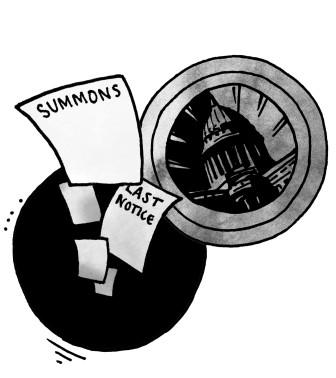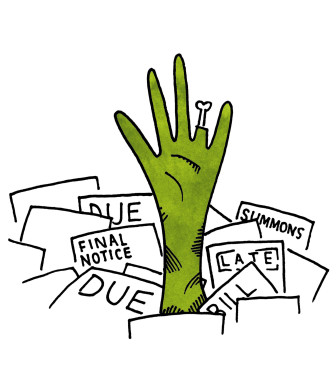New State Law Helps Debt Collectors
Makes it easy for debt buyers to target consumers with poorly documented claims.
The ‘telephone game’
Conneely said Goodwin’s situation is not uncommon. Debts can be bought and sold more than once. By the time someone is sued, how much is owed and to whom it is owed may be unrecognizable.
The FTC found that debt buyers often received very little information about the debts they purchased, usually packaged in one spreadsheet with many other debts. And the accuracy of the information is not guaranteed. The likelihood that the information is inaccurate grows as the debt ages.
“It’s sort of like the telephone game,” Conneely said. “It starts here, and by the time it comes around … years later, who knows what you’re going to see and what information is available?”

Stacia Conneely, staff attorney at Legal Action of Wisconsin, offers free legal advice to clients who are fighting suits brought by debt collectors. Conneely said consumers can fight such actions if they can show it is for the wrong amount, charged to the wrong person or has already been settled through bankruptcy. Photo by Coburn Dukehart of the Wisconsin Center for Investigative Journalism.
She said in Goodwin’s case, Jefferson Capital had purchased her debt, which originated from an online school called The College Network.
Goodwin said she never took the online course she signed up for, and she tried unsuccessfully to cancel it. Although she did sign a promissory note in 2011, Goodwin said she was legally blind at the time because of a stroke and did not know what she was signing.
The law firm representing Jefferson Capital did not return messages seeking comment. Conneely said she is working on an out-of-court settlement.
A growing industry
The debt buying industry took off during the savings and loan crisis of the late 80s and early 90s, growing significantly in the early 2000s. The industry took a hit during the recession that began in 2007 when desirable debt was in low supply and more expensive.
The industry is thriving again: Third-party debt buyers recovered approximately $55.2 billion in 2013, earning close to $10.4 billion in commissions and fees, according to a 2014 Association of Credit and Collections Professionals report.
By the FTC’s count, there are now “hundreds, if not thousands” of debt buyers. Although some are small, large players purchase most debt. In 2008, 76.1 percent of all debt sold in the United States was bought by nine large companies. Buyers in 2009 paid an average of 4 cents on the dollar, and older debt was generally cheaper than newer debt.
Beth Steelman of Clinton was sued by one of those big debt buyers last summer. She asked that the company not be named because she is afraid of getting sued again.
Steelman said she found out about the lawsuit when she was contacted by defense attorneys soliciting her business. She said she was never legally notified of the lawsuit. Online court records show the creditor attempted but failed to serve notice that she was being sued.
Once she confirmed that, Steelman asked the company to provide details about the debt, which was between $1,000 and $1,500. It provided the last six numbers of one of her old credit cards.
“If I had tried to fight it, I could tell I was really up against Goliath,” she said.
Steelman paid the company two installments of about $289 each, and the lawsuit was dropped. She continues to get collection letters and is not sure if she still owes the company money.
“I’m very paranoid now,” Steelman said, adding that she checks court records every week to ensure she is not being sued. She called the new law “terrifying” and “heartbreaking.”
“And that means now I’ll probably be checking daily instead of weekly,” she said.
‘Sewer service’

In an illegal practice sometimes called “sewer service,” a debt collector does not serve notice of a lawsuit and then falsifies records saying it was served, figuratively throwing the papers in the sewer. This ensures a no-show in court — and a win for the creditor. Illustration by Jacob Berchem of the Wisconsin Center for Investigative Journalism.
In some cases, alleged debtors are never notified of the lawsuit, ensuring a no-show in court and a win for the creditor. In a practice sometimes called “sewer service,” a collector falsifies records saying a summons was served when it was not, figuratively throwing the papers in the sewer. In 2010, New York’s attorney general sued to throw out about 100,000 judgments that had been obtained this way.
According to a new study by Human Rights Watch, the debt buying industry is “heavily reliant on litigation,” and judges often “rubber stamp” judgments that can be filled with errors and “enormous accumulations of interest.”
“Many debt buyer lawsuits rest on a foundation of highly questionable information and evidence,” Human Rights Watch found. “Debt buyers do not always receive meaningful evidence in support of their claims when they purchase a debt, and in some cases the sellers explicitly refuse to warrant that any of the information they passed on is accurate or even that the debts are legally enforceable.”
Wisconsin’s online circuit court database shows that between 2003 and March 22 of this year, Jefferson Capital, the company that sued Sandra Goodwin, had filed 2,630 cases against Wisconsin consumers. Nearly 3,000 cases were filed by debt buyer Portfolio Recovery Associates since 1998. Another major player, Absolute Resolutions, has filed 535 cases against Wisconsin debtors since 2014. Hundreds more cases have been filed by companies including Unifund, Transworld Systems and Midland Funding.
‘Zombie debt’

Debt that is no longer legally collectible but creditors continue to pursue has been referred to as “zombie debt.” In Wisconsin, some consumer debt is extinguished after six years. Illustration by Jacob Berchem of the Wisconsin Center for Investigative Journalism.
Once debts reach a certain age, they can be deemed no longer collectible. In Wisconsin, it is generally six years. Wisconsin and Mississippi are the only states where certain debts are completely extinguished once they are past that statute of limitations. Debt that is past that date but which creditors continue to pursue has been referred to as “zombie debt.”
In theory, the fact that a debt is no longer collectible should be a good defense in court. It is already a violation of the federal Fair Debt Collection Practices Act to file an action in court to collect an expired debt. However, the National Consumer Law Center said most debtors do not know the laws exist and may not show up in court to contest it. The center recommends a federal ban on any efforts to collect zombie debt, including phone calls or letters.
Fons confirmed that creditors sometimes do secure judgments on these so-called zombie debts “because they (companies) don’t get caught very often.”
Consumer concerns
From 2011 through 2015, the Wisconsin Department of Financial Institutions received 2,351 complaints about debt collectors, including third-party buyers, Wisconsin Public Radio found.
At the federal level, Wisconsin consumers have filed more than 1,100 complaints with the Consumer Financial Protection Bureau since July 2013 about all kinds of debt collectors. Americollect, a Manitowoc-based collections agency that uses the slogan “ridiculously nice collections,” was the most complained-about company with 44 complaints. “Debt was paid” and “debt is not mine” were common reasons cited in the complaints.
Even with so many complaints, the FTC has found consumers dispute only 3.2 percent of cases in which debt buyers attempted to collect. The commission noted that this figure “is likely to understate these problems.”
-
Few SNAP Recipients Reimbursed for Spoiled Food
 Apr 9th, 2024 by Addie Costello
Apr 9th, 2024 by Addie Costello
-
Claire Woodall’s Plan to Restore Trust in Milwaukee’s Election Process
 Apr 8th, 2024 by Alexander Shur
Apr 8th, 2024 by Alexander Shur
-
Wisconsin’s Medicaid Postpartum Protection Lags Most States
 Feb 27th, 2024 by Rachel Hale
Feb 27th, 2024 by Rachel Hale
















